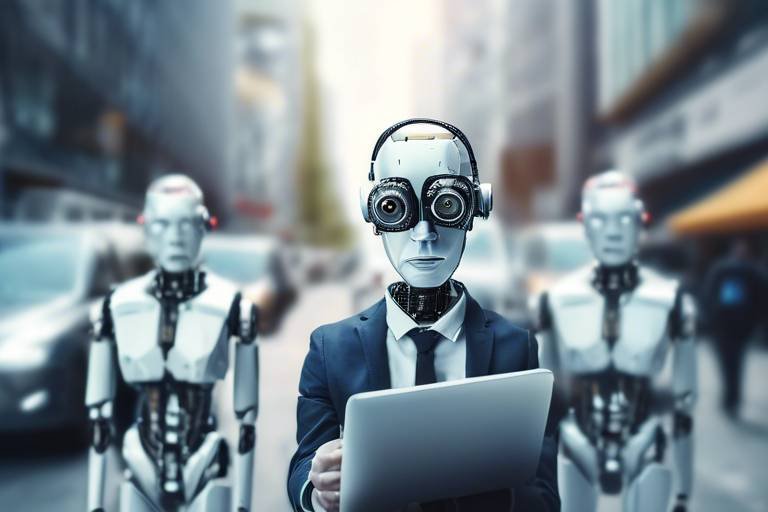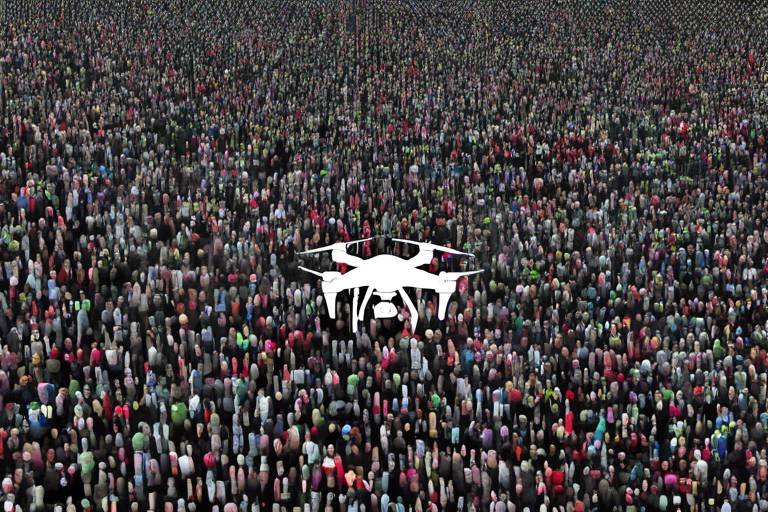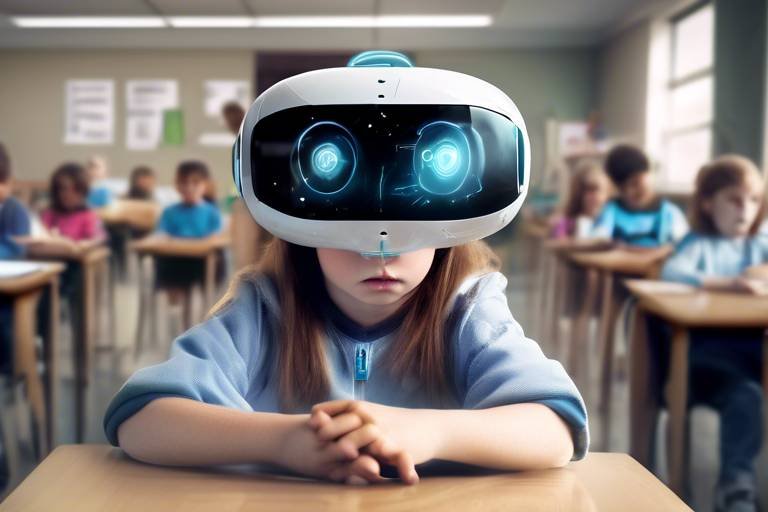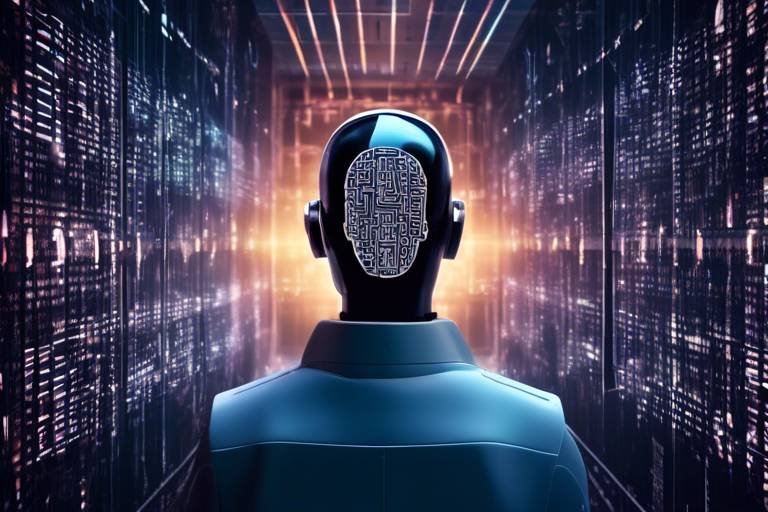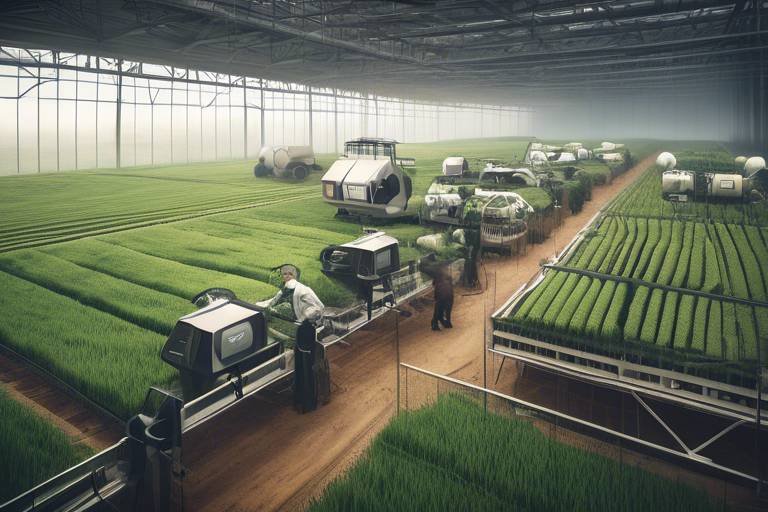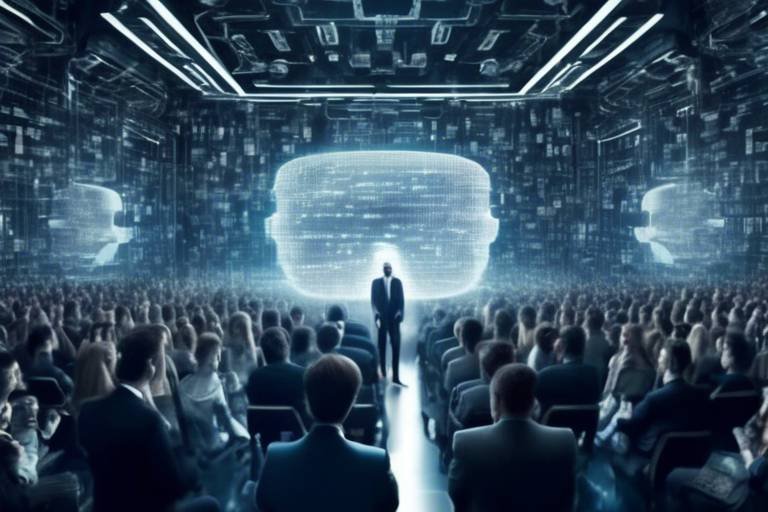AI: An Unprecedented Force in the Hospitality Industry
The hospitality industry is undergoing a remarkable transformation thanks to the advent of artificial intelligence (AI). This technological revolution is not just a trend; it’s a game-changer that is reshaping how hotels, restaurants, and other service-oriented businesses operate. Imagine walking into a hotel where your preferences are already known, or dining at a restaurant where the menu is customized just for you. This is the reality that AI is creating, making it an unprecedented force in the hospitality sector.
At its core, AI enhances the way businesses interact with their customers. It enables a level of personalization that was previously unimaginable. For instance, through the use of chatbots and virtual assistants, hotels can provide immediate assistance to guests, answering queries and resolving issues at any hour of the day. This not only boosts guest satisfaction but also streamlines operations, allowing human staff to focus on more complex tasks that require a personal touch.
Moreover, AI isn't just about improving customer service; it also plays a crucial role in data analytics. By leveraging AI-driven analytics, hospitality businesses can gain deep insights into customer behavior and preferences. This information can be utilized to craft tailored marketing strategies, ensuring that businesses meet their customers' needs effectively. As the industry continues to embrace these technologies, the potential for growth and innovation becomes limitless.
However, the integration of AI into the hospitality landscape is not without its challenges. Issues such as data privacy, high implementation costs, and the necessity for staff training pose significant hurdles. Yet, the potential rewards are enormous. As AI technology evolves, it promises to bring forth even more sophisticated solutions that can enhance guest experiences and operational efficiency.
In the coming sections, we will delve deeper into how AI is shaping various aspects of the hospitality industry, from customer service to operational efficiency, and explore the challenges that come with these advancements. The future is bright for AI in hospitality, and those who adapt will undoubtedly thrive in this ever-changing environment.
- How is AI used in customer service within the hospitality industry?
AI is utilized through chatbots and virtual assistants that provide personalized responses to guest inquiries, enhancing overall satisfaction.
- What are the benefits of AI-driven data analytics?
AI analytics help businesses understand customer preferences, enabling tailored marketing and improved decision-making.
- What challenges does AI face in hospitality?
Key challenges include data privacy concerns, high implementation costs, and the need for staff training to adapt to new technologies.
- What does the future hold for AI in hospitality?
The future promises further advancements in machine learning and robotics, leading to innovative solutions that enhance guest experiences.

The Role of AI in Customer Service
Artificial Intelligence (AI) is not just a buzzword; it's a game-changer in the hospitality industry, especially when it comes to customer service. Imagine walking into a hotel where a friendly virtual assistant greets you by name, remembers your preferences, and even suggests activities based on your interests. This is not science fiction; it's the new reality brought about by AI. By leveraging advanced algorithms and machine learning, hospitality businesses can offer personalized experiences that make guests feel special and valued.
One of the most remarkable aspects of AI in customer service is its ability to provide 24/7 support. Hotels and restaurants can deploy chatbots that handle inquiries, reservations, and even complaints around the clock. This means that whether it's the middle of the night or a busy Sunday brunch, guests can get immediate assistance without waiting for a human staff member to become available. The efficiency of AI not only enhances guest satisfaction but also allows human staff to focus on more complex issues that require a personal touch.
Furthermore, AI can analyze vast amounts of data to understand customer behavior and preferences. For instance, by examining past bookings, reviews, and social media interactions, AI systems can predict what a guest might want even before they ask. This capability allows hotels and restaurants to tailor their services in ways that were previously unimaginable. For example, if a guest often orders vegan meals, the restaurant can proactively suggest similar dishes during their next visit. This level of personalization creates a memorable experience that fosters loyalty and encourages repeat visits.
However, it's not just about enhancing the guest experience; AI also streamlines operations behind the scenes. When customer service representatives are supported by AI tools, they can access information quickly and accurately, enabling them to resolve issues more efficiently. Imagine a front desk staff member who can instantly pull up a guest's history, preferences, and any ongoing issues with just a few clicks. This capability not only speeds up service but also minimizes the chances of errors, leading to a smoother overall experience.
In summary, AI is revolutionizing customer service in the hospitality sector by providing personalized experiences, ensuring round-the-clock support, and enhancing operational efficiency. As technology continues to evolve, we can expect even more innovative solutions that will redefine how guests interact with hospitality brands.
- How does AI improve customer service in hospitality? AI improves customer service by providing personalized experiences, offering 24/7 support through chatbots, and streamlining operations for faster service.
- What are the benefits of using chatbots in hotels? Chatbots can handle inquiries and reservations at any time, allowing human staff to focus on more complex tasks and improving overall guest satisfaction.
- Can AI predict customer preferences? Yes, AI can analyze past data to predict customer preferences, enabling businesses to tailor their services accordingly.

AI-Driven Data Analytics
In the fast-paced world of hospitality, understanding customer preferences and behaviors is crucial for success. This is where comes into play, acting as a powerful tool that helps hotels and restaurants make sense of vast amounts of data. Imagine having a crystal ball that provides insights into what your guests want, when they want it, and how much they are willing to pay. With AI, that dream is becoming a reality.
By leveraging advanced algorithms and machine learning, businesses can analyze historical data to uncover patterns and trends that were previously hidden. For instance, hotels can track guest preferences, such as room types, amenities, and dining choices, allowing them to tailor their offerings to meet specific needs. This level of personalization not only enhances the guest experience but also boosts customer loyalty, as guests feel valued and understood.
Moreover, AI-driven analytics can significantly improve marketing strategies. By identifying the demographics of satisfied customers, businesses can create targeted campaigns that resonate with their audience. Imagine a hotel that knows its guests prefer eco-friendly products; it can then promote its sustainability initiatives in its marketing materials, attracting like-minded individuals. The result? Higher booking rates and a stronger brand image.
One of the standout features of AI analytics is its ability to perform predictive analytics. This technique uses historical data to forecast future trends, which is invaluable for demand forecasting. For example, a restaurant can analyze past dining trends during holidays or special events to predict how many staff members will be needed, what dishes to prepare, and how much inventory to stock. This not only streamlines operations but also minimizes waste, ultimately leading to cost savings.
| Feature | Benefit |
|---|---|
| Personalized Marketing | Targeted campaigns based on customer preferences increase engagement. |
| Demand Forecasting | Optimizes staffing and inventory management, reducing costs. |
| Enhanced Customer Insights | Improves guest satisfaction through tailored experiences. |
However, it's crucial to note that while the advantages are substantial, the implementation of AI-driven data analytics does come with its challenges. Businesses must ensure they have the right infrastructure in place to handle the data and that they comply with data privacy regulations. After all, trust is a vital currency in the hospitality industry, and guests need to feel confident that their information is secure.
In conclusion, AI-driven data analytics is not just a trend; it is a transformative force that is reshaping the hospitality landscape. By harnessing the power of data, businesses can create exceptional guest experiences, optimize their operations, and ultimately drive profitability. As technology continues to evolve, those who embrace AI analytics will undoubtedly lead the charge in delivering unparalleled service and satisfaction.
- What is AI-driven data analytics? AI-driven data analytics involves using artificial intelligence to analyze large sets of data to gain insights into customer behavior and preferences.
- How can AI improve customer experiences in hospitality? AI can provide personalized recommendations, streamline service delivery, and anticipate guest needs, enhancing overall satisfaction.
- Are there any challenges in implementing AI analytics? Yes, challenges include data privacy concerns, the need for proper infrastructure, and ensuring staff are trained to use the technology effectively.

Predictive Analytics for Demand Forecasting
In the fast-paced world of hospitality, understanding customer demand is akin to having a crystal ball. Predictive analytics serves as that crystal ball, utilizing historical data to forecast future trends. Imagine being able to anticipate when guests are most likely to check in or when a restaurant will see a surge in diners. This capability allows businesses to optimize their operations, ensuring they are adequately staffed and stocked to meet customer needs without overextending their resources.
By analyzing various factors such as seasonality, local events, and historical booking patterns, predictive analytics can provide invaluable insights. For instance, if a hotel notices a consistent uptick in bookings during a particular festival, they can prepare by adjusting their staffing levels and marketing strategies accordingly. This not only enhances operational efficiency but also improves the overall guest experience, as hotels can offer timely services and personalized attention.
Moreover, predictive analytics can inform inventory management. For example, a restaurant can analyze past sales data to predict which menu items are likely to be popular during a busy weekend. Armed with this knowledge, they can ensure that they have sufficient ingredients on hand, reducing waste and maximizing profitability.
To illustrate the impact of predictive analytics, consider the following table that outlines the key benefits for hospitality businesses:
| Benefit | Description |
|---|---|
| Optimized Staffing | Ensures the right number of staff are scheduled during peak times, enhancing service quality. |
| Improved Inventory Management | Reduces waste by predicting stock needs accurately, ensuring fresh supplies. |
| Enhanced Marketing Strategies | Allows for targeted campaigns based on predicted customer behavior, improving conversion rates. |
However, it's important to note that while predictive analytics offers numerous advantages, it is not without its challenges. The accuracy of predictions heavily relies on the quality of data collected. Poor data can lead to misguided strategies and potential losses. Therefore, businesses must prioritize data integrity and invest in robust data collection processes.
In conclusion, predictive analytics is revolutionizing demand forecasting in the hospitality industry. By leveraging historical data, businesses can not only anticipate customer needs but also streamline their operations for maximum efficiency. As technology continues to evolve, the accuracy and capabilities of predictive analytics will only improve, paving the way for a more responsive and customer-centric hospitality experience.
- What is predictive analytics? Predictive analytics refers to the use of statistical algorithms and machine learning techniques to identify the likelihood of future outcomes based on historical data.
- How does predictive analytics benefit the hospitality industry? It helps businesses anticipate customer demand, optimize staffing and inventory, and enhance marketing strategies, ultimately leading to improved guest experiences.
- What data is needed for effective predictive analytics? Historical booking data, customer demographics, local events, and seasonal trends are some of the key data points needed for accurate predictions.
- Are there challenges associated with predictive analytics? Yes, challenges include ensuring data quality, the need for skilled personnel to interpret data, and the initial costs of implementing advanced analytics tools.

Optimizing Pricing Strategies
In the ever-competitive landscape of the hospitality industry, has become a vital component for success. With the advent of artificial intelligence, hotels and restaurants can now leverage sophisticated algorithms that analyze a multitude of factors to determine the most effective pricing models. Imagine having a personal pricing consultant that works around the clock, crunching numbers and analyzing trends to ensure that your prices are just right—this is the reality that AI brings to the table.
AI-driven pricing strategies utilize real-time data to assess market conditions, competitor pricing, and even consumer behavior. This means that instead of relying on outdated pricing models or guesswork, businesses can make informed decisions based on current trends. For instance, during peak seasons or special events, AI can suggest price adjustments that maximize revenue without scaring away potential guests. Conversely, during low-demand periods, it can recommend discounts or promotional offers to attract more customers.
Furthermore, AI can take into account various external factors such as local events, weather conditions, and even social media sentiment. By analyzing these variables, AI can help businesses stay ahead of the curve and adjust their pricing strategies accordingly. For example, if a major concert is happening nearby, AI can recommend raising prices due to increased demand. On the flip side, if a storm is forecasted, it might suggest lowering rates to entice guests who may otherwise cancel their plans.
To illustrate the effectiveness of AI in pricing optimization, consider the following table that compares traditional pricing methods with AI-driven strategies:
| Aspect | Traditional Pricing | AI-Driven Pricing |
|---|---|---|
| Data Utilization | Limited historical data | Real-time data analysis |
| Flexibility | Rigid pricing structures | Dynamic pricing adjustments |
| Market Responsiveness | Slow to react | Immediate adjustments |
| Revenue Potential | Fixed revenue models | Maximized revenue opportunities |
This table highlights that while traditional pricing methods often rely on static data and inflexible models, AI-driven strategies offer a dynamic approach that can significantly enhance revenue potential. By continuously learning and adapting to market changes, AI not only optimizes pricing strategies but also helps businesses understand their customers better.
In conclusion, the power of AI in optimizing pricing strategies cannot be overstated. By harnessing the capabilities of AI, hospitality businesses can ensure they remain competitive, maximize their revenue, and ultimately provide better value to their guests. The future of pricing in the hospitality industry is not just about setting a price; it’s about understanding the market, anticipating trends, and making data-driven decisions that lead to success.
- How does AI improve pricing strategies in hospitality?
AI analyzes real-time data, market conditions, and consumer behavior to suggest optimal pricing adjustments. - Is AI pricing only beneficial for large hotels and chains?
No, AI can be beneficial for businesses of all sizes by providing insights that help in making informed pricing decisions. - What are the risks associated with AI-driven pricing?
Potential risks include over-reliance on technology and the need for constant data monitoring to ensure accuracy.

Enhancing Guest Personalization
In the bustling world of hospitality, personalization isn’t just a luxury; it’s a necessity. With the advent of artificial intelligence, hotels and restaurants can now offer experiences that feel tailor-made for each guest. Imagine checking into a hotel where your favorite music is already playing, or a restaurant where the waiter knows your dietary preferences without you having to say a word. This is the future that AI is shaping, and it’s nothing short of revolutionary.
AI-driven systems analyze vast amounts of guest data, from previous stays to online interactions, to create a comprehensive profile for each visitor. By leveraging this information, businesses can deliver personalized recommendations and experiences that resonate deeply with guests. For instance, if a guest frequently orders vegan dishes, AI can suggest similar options or even create a special menu just for them during their next visit. This level of attention not only enhances guest satisfaction but also fosters loyalty, as customers feel valued and understood.
But how does this all work? Let’s break it down:
- Data Collection: AI systems gather data from various touchpoints, including booking platforms, social media, and direct feedback.
- Behavior Analysis: Using machine learning algorithms, AI identifies patterns in guest behavior, preferences, and feedback.
- Tailored Experiences: Based on the insights gained, businesses can curate personalized experiences, from room settings to dining options.
Moreover, AI can enhance guest personalization in real-time. For example, consider a scenario where a guest checks into a hotel after a long flight. AI can promptly analyze their previous stays and suggest a room with a preferred view or amenities. This not only improves the immediate experience but also builds a stronger connection between the guest and the establishment.
Another fascinating aspect of AI in guest personalization is its ability to adapt. Imagine a guest who, during their last visit, requested a specific type of pillow. The next time they book, the system can automatically note this preference and ensure the room is set up accordingly. This kind of proactive service is what sets establishments apart in a competitive market.
In summary, the integration of AI in enhancing guest personalization is a game-changer for the hospitality industry. It transforms the way businesses interact with their guests, making each experience unique and memorable. The result? Higher satisfaction rates, increased loyalty, and a significant boost to the bottom line.
- How does AI personalize guest experiences?
AI analyzes guest data to understand preferences and behaviors, allowing businesses to tailor services and recommendations.
- What types of data does AI use for personalization?
AI utilizes data from bookings, past interactions, social media, and direct feedback to create guest profiles.
- Can AI adapt to changing guest preferences?
Yes, AI systems continuously learn and adapt based on new data, ensuring that personalization remains relevant and effective.

Real-Time Performance Monitoring
In the fast-paced world of hospitality, is becoming a game changer. Imagine a scenario where hotel managers can instantly track the quality of service being delivered to guests, identify potential issues before they escalate, and ensure that every visitor leaves with a smile. This is not just a dream; it’s the reality brought forth by artificial intelligence.
AI-driven tools are now capable of monitoring service performance in real-time, which means that managers can access critical data on various aspects of their operations at the click of a button. For instance, they can evaluate how quickly guests are being checked in, the efficiency of housekeeping staff, and even the satisfaction levels of diners in a restaurant. This immediacy allows for swift interventions, ensuring that any hiccups in service are addressed before they affect guest experiences.
Moreover, AI systems can analyze data from multiple sources, including guest feedback, staff performance metrics, and operational workflows. By synthesizing this information, these systems can provide actionable insights that help managers make informed decisions. For example, if a particular restaurant is receiving negative feedback about wait times, the AI can alert managers to the issue, prompting them to allocate more staff during peak hours.
To illustrate the benefits of real-time performance monitoring, consider the following table:
| Performance Metric | Traditional Monitoring | AI-Driven Monitoring |
|---|---|---|
| Guest Check-In Time | Daily reports | Instant alerts |
| Housekeeping Efficiency | Weekly reviews | Real-time tracking |
| Customer Satisfaction | Post-stay surveys | Live feedback analysis |
This table clearly shows how AI not only streamlines the monitoring process but also enhances the responsiveness of hospitality operations. With AI, managers can shift from a reactive to a proactive approach in managing their services, which can significantly boost guest satisfaction and loyalty.
Additionally, the implementation of real-time performance monitoring fosters a culture of continuous improvement within hospitality establishments. By regularly analyzing performance data, businesses can identify trends and areas for enhancement, leading to ongoing training and development for staff. This not only improves service delivery but also empowers employees, making them feel more engaged and valued in their roles.
In conclusion, real-time performance monitoring powered by artificial intelligence is not just a technological upgrade; it’s a fundamental shift in how hospitality businesses operate. By leveraging these advanced tools, managers can ensure that they are not only meeting but exceeding guest expectations, paving the way for a more successful and sustainable future in the hospitality industry.
- What is real-time performance monitoring? Real-time performance monitoring refers to the continuous tracking of service metrics and guest feedback to ensure optimal service delivery in hospitality.
- How does AI improve performance monitoring? AI enhances performance monitoring by providing instant data analysis, alerting managers to issues as they arise, and offering actionable insights for improvement.
- Can small hotels benefit from AI monitoring tools? Absolutely! While the initial investment may seem daunting, the long-term benefits of improved guest satisfaction and operational efficiency can significantly outweigh the costs.

AI and Operational Efficiency
In the fast-paced world of hospitality, operational efficiency is the name of the game, and artificial intelligence (AI) is stepping up to the plate like a seasoned pro. Imagine a bustling hotel lobby where guests are checking in, dining, and enjoying amenities all at once. Now, picture the behind-the-scenes magic that AI brings to ensure everything runs smoothly. By automating routine tasks and streamlining workflows, AI not only enhances staff productivity but also leads to significant cost savings. This is not just a trend; it’s a revolution that is reshaping how hospitality businesses operate.
One of the most significant benefits of AI in operational efficiency is its ability to automate routine tasks. Think about the time-consuming processes like check-ins and check-outs, which can often lead to long lines and frustrated guests. With AI-powered systems, these processes can be streamlined. For example, guests can check in through a mobile app or kiosk, allowing them to bypass the front desk entirely. This not only speeds up the process but also frees up staff to focus on providing exceptional customer service. Instead of handling mundane tasks, employees can engage with guests, ensuring their needs are met and expectations exceeded.
Furthermore, AI plays a crucial role in smart inventory management. Imagine a restaurant that runs out of a popular dish during peak hours or a hotel that over-orders supplies, leading to waste. AI systems can predict stock needs based on historical data and current trends, allowing businesses to maintain optimal inventory levels. This predictive capability helps reduce waste, ensuring that resources are used efficiently and sustainably. For instance, a hotel might use AI to analyze guest booking patterns, adjusting their inventory for toiletries and linens accordingly. This not only cuts costs but also enhances the guest experience by ensuring that everything they need is readily available.
Let’s not forget about the incredible potential for real-time performance monitoring. AI tools can track service performance in real-time, providing management with instant feedback on how operations are running. If a specific service is lagging, managers can quickly address the issue, whether it’s reallocating staff or enhancing training. This capability ensures that quality is maintained, and guest experiences are consistently positive. For example, if an AI system detects that room service is taking longer than usual, it can alert management to investigate and resolve the delay, thereby keeping guests happy and satisfied.
In summary, the integration of AI into hospitality operations is not just about keeping up with technology; it’s about transforming the entire service landscape. By automating routine tasks, enhancing inventory management, and enabling real-time performance monitoring, AI is paving the way for a more efficient, cost-effective, and guest-focused industry. The future looks bright, and those who embrace these advancements will undoubtedly lead the charge in delivering exceptional hospitality experiences.
- How does AI improve customer service in hospitality?
AI enhances customer service by providing personalized experiences through chatbots and virtual assistants, allowing for efficient communication and quicker responses to guest inquiries. - What are the cost implications of implementing AI in hospitality?
While the initial investment in AI technologies can be high, the long-term benefits, such as increased efficiency and reduced labor costs, often outweigh these costs. - Can AI help in managing staff productivity?
Yes, by automating routine tasks, AI enables staff to focus on higher-value interactions with guests, thereby improving overall productivity. - What challenges do hotels face when integrating AI?
Challenges include data privacy concerns, the high cost of implementation, and the need for staff training to adapt to new technologies.

Automating Routine Tasks
In the fast-paced world of hospitality, where every second counts, has become a game-changer. Imagine walking into a hotel where the check-in process is as seamless as a breeze—no long lines, no tedious paperwork, just a warm welcome and a key card in hand. This is the reality that artificial intelligence (AI) brings to the table. By automating mundane tasks, hotels and restaurants can not only enhance operational efficiency but also create a more enjoyable experience for guests.
One of the most significant areas where automation shines is in the check-in and check-out processes. With the help of AI-driven kiosks and mobile apps, guests can complete their check-in from the comfort of their own devices. This not only saves time but also reduces the pressure on front desk staff, allowing them to focus on providing personalized service. Furthermore, automated systems can send notifications to guests regarding their room status, special offers, or even local events, keeping them informed and engaged throughout their stay.
Another routine task that benefits from automation is housekeeping management. AI systems can track room occupancy and cleaning schedules, ensuring that rooms are cleaned promptly and efficiently. For example, a hotel can use AI to predict when a room will be vacated based on historical data and occupancy trends. This allows housekeeping staff to optimize their workflow, reducing downtime and ensuring that rooms are ready for incoming guests as quickly as possible.
Moreover, automation extends to inventory management. AI can monitor stock levels in real time, alerting staff when supplies are running low and even predicting future needs based on usage patterns. This not only minimizes waste but also ensures that the establishment is always well-stocked, enhancing the overall guest experience. For instance, if a restaurant's AI system notices a spike in demand for a particular dish, it can automatically adjust inventory orders to meet that demand, preventing shortages and ensuring customer satisfaction.
In addition to improving efficiency, automating routine tasks can lead to substantial cost savings. By reducing the time spent on manual processes, businesses can allocate resources more effectively, allowing staff to engage in higher-value interactions with guests. This shift not only boosts employee morale but also enhances the overall guest experience, as staff can dedicate more time to personalized service rather than administrative tasks.
However, it's essential to recognize that while automation brings numerous benefits, it should not completely replace the human touch that is so vital in hospitality. The goal is to strike a balance between leveraging technology and maintaining genuine human interactions. After all, guests often return not just for the amenities but for the connections they make with the staff. Therefore, the successful implementation of AI in automating routine tasks lies in enhancing, rather than replacing, the personal touch that defines the hospitality industry.
- What tasks can be automated in the hospitality industry?
Common tasks include check-in and check-out processes, housekeeping management, and inventory tracking.
- How does automation improve guest experience?
Automation reduces wait times and ensures that services are delivered promptly, allowing staff to focus on personalized guest interactions.
- Are there any downsides to automating tasks?
While automation can enhance efficiency, it's crucial to maintain the human element in hospitality to ensure guests feel valued and connected.

Smart Inventory Management
In the bustling world of hospitality, where every second counts and every guest's experience is paramount, emerges as a critical player. Imagine a hotel that never runs out of essential supplies, or a restaurant that can perfectly predict its ingredient needs for the week. This is not just a fantasy; it's becoming a reality thanks to the integration of artificial intelligence (AI) into inventory systems.
AI-driven inventory management systems utilize sophisticated algorithms and real-time data analysis to optimize stock levels, predict future needs, and reduce waste. By analyzing historical consumption patterns and current trends, these systems can forecast what supplies will be needed and when, allowing businesses to maintain an optimal inventory without overstocking or running out of crucial items.
For instance, a hotel can use AI to track the usage of linens, toiletries, and food supplies, adjusting orders based on occupancy rates and seasonal trends. This not only saves money but also ensures that guests always have access to the amenities they expect. Similarly, restaurants can benefit from AI by predicting the demand for certain dishes based on factors like weather, local events, and historical sales data. This predictive capability allows for better menu planning and reduces food waste, which is a significant concern in the food service industry.
Moreover, the implementation of AI in inventory management can lead to enhanced sustainability practices. By minimizing waste and optimizing resource use, hospitality businesses can operate more sustainably, which is increasingly important to today’s eco-conscious consumers. This not only helps the environment but also boosts the brand image and customer loyalty.
To illustrate the impact of smart inventory management, consider the following table:
| Benefit | Description |
|---|---|
| Cost Savings | Reduces unnecessary purchases and waste, leading to lower operational costs. |
| Efficiency | Streamlines ordering processes and reduces time spent on inventory management. |
| Customer Satisfaction | Ensures that essential supplies are always available, enhancing guest experiences. |
| Sustainability | Minimizes waste and promotes responsible resource usage. |
In conclusion, the integration of AI into inventory management is revolutionizing how hospitality businesses operate. By leveraging data and predictive analytics, establishments can not only improve their bottom line but also enhance the overall guest experience. As we move forward, the role of smart inventory management will undoubtedly become even more significant, paving the way for a more efficient and sustainable future in the hospitality industry.
Q1: How does AI improve inventory management in hospitality?
AI improves inventory management by analyzing data to predict needs, optimizing stock levels, and reducing waste, ensuring that businesses have the right supplies at the right time.
Q2: What are the cost implications of implementing AI for inventory management?
While the initial investment can be high, the long-term savings from reduced waste and optimized purchasing often justify the costs.
Q3: Can small hotels benefit from AI inventory management systems?
Absolutely! AI systems can be scaled to fit businesses of all sizes, helping even small hotels optimize their inventory management processes.
Q4: How does smart inventory management contribute to sustainability?
By minimizing waste and optimizing resource usage, smart inventory management helps businesses operate more sustainably, which is increasingly important to consumers.

Challenges of Implementing AI
As the hospitality industry embraces the power of artificial intelligence, it’s crucial to recognize that this technological leap does not come without its fair share of challenges. One of the most pressing issues is data privacy and security. With AI systems continuously collecting and analyzing vast amounts of customer data, ensuring that this information is kept safe from breaches becomes paramount. Guests expect their personal information to be handled with utmost care, and any misstep can lead to a loss of trust that can be detrimental to a business. Regulations like the General Data Protection Regulation (GDPR) in Europe impose strict guidelines on data usage, which means that hospitality businesses must be diligent in their compliance efforts.
Another significant hurdle is the cost of implementation. While the long-term benefits of AI integration can be substantial, the initial investment can be a barrier, especially for smaller establishments. The costs associated with acquiring technology, training staff, and maintaining systems can add up quickly. For instance, a small boutique hotel may struggle to justify the expense of deploying an AI-driven booking system when compared to the potential revenue boosts it promises. However, it’s essential for these businesses to consider AI as a long-term investment that can enhance their operational efficiency and guest satisfaction over time.
Moreover, the need for staff training cannot be overlooked. As AI technologies evolve, so too must the skills of the workforce. Employees may feel overwhelmed or resistant to adopting new systems, particularly if they are accustomed to traditional methods of operation. Training programs must be implemented to ensure that staff members are not only comfortable with AI tools but also understand how to leverage them to improve service delivery. This transition can be time-consuming and may temporarily disrupt operations, leading to further challenges in the short term.
In summary, while the integration of AI in the hospitality sector presents exciting opportunities, the challenges it brings are equally significant. Businesses must navigate the complexities of data privacy, manage the costs associated with implementation, and invest in staff training to fully harness the potential of AI. Addressing these challenges head-on will be crucial for those looking to thrive in this rapidly evolving landscape.
- What are the main challenges of implementing AI in hospitality?
Data privacy, high costs, and staff training are the primary challenges faced by businesses. - How can businesses ensure data privacy when using AI?
Implementing strong security measures and adhering to regulations like GDPR can help maintain data privacy. - Is AI implementation worth the investment for small hotels?
While initial costs may be high, the long-term benefits of improved efficiency and guest satisfaction can justify the investment.

Data Privacy and Security Issues
As the hospitality industry increasingly embraces artificial intelligence, the significance of data privacy and security cannot be overstated. With AI systems collecting and analyzing vast amounts of customer data, businesses must tread carefully to maintain trust and comply with regulations. Imagine checking into a hotel and having your preferences remembered—sounds great, right? But what happens when that data falls into the wrong hands? The risks are real, and they can have catastrophic consequences for both customers and businesses.
First and foremost, the collection of sensitive information such as personal identification details, payment information, and even behavioral patterns raises ethical questions. Customers expect their data to be handled with the utmost care, and any breach could lead to significant reputational damage. In fact, a study by IBM found that the average cost of a data breach in the hospitality sector can reach up to $4.24 million. This staggering figure highlights why data security should be a top priority for any establishment.
Moreover, regulatory frameworks such as the General Data Protection Regulation (GDPR) in Europe and the California Consumer Privacy Act (CCPA) impose strict guidelines on how businesses can collect, store, and use personal data. Non-compliance not only results in hefty fines but also damages customer trust. To mitigate these risks, hotels and restaurants must implement robust data protection strategies, including:
- Encryption: Ensuring that all sensitive data is encrypted both at rest and in transit.
- Access Controls: Limiting access to sensitive data to only those who absolutely need it.
- Regular Audits: Conducting frequent audits to identify vulnerabilities and rectify them promptly.
In addition to technical measures, fostering a culture of data privacy awareness among staff is crucial. Employees should be trained on the importance of data protection, recognizing potential risks, and understanding the legal implications of mishandling customer information. This comprehensive approach not only safeguards customer data but also enhances the overall credibility of the business.
Ultimately, the key to navigating the challenges of data privacy and security in the AI-driven hospitality landscape lies in transparency. Establishments should openly communicate their data practices to customers, ensuring they understand what data is collected, how it is used, and the measures in place to protect it. This level of transparency can transform a potential liability into a competitive advantage, as customers are more likely to choose businesses that prioritize their privacy.
- What are the main data privacy concerns in the hospitality industry?
The primary concerns include unauthorized access to personal data, data breaches, and compliance with regulations like GDPR and CCPA.
- How can hotels ensure data security?
Implementing encryption, access controls, and conducting regular audits can significantly enhance data security.
- What should customers know about their data?
Customers should be informed about what data is collected, how it is used, and the measures taken to protect their information.

Cost of Implementation
When it comes to integrating AI technologies within the hospitality industry, one of the most significant hurdles that businesses face is the . It's no secret that the initial investment can be quite substantial. For many small hotels and restaurants, this upfront expense can feel overwhelming. However, it’s essential to consider this investment as a long-term strategy rather than just a short-term expense.
Implementing AI solutions often involves various costs, including:
- Software Acquisition: Purchasing or subscribing to AI software can be a significant initial cost. This includes everything from chatbots to data analytics platforms.
- Hardware Upgrades: Some AI applications may require updated hardware, which adds to the overall expense.
- Training and Development: Staff need to be trained to use these new technologies effectively. This training can take time and resources, further contributing to costs.
- Maintenance and Support: Ongoing technical support and software updates are necessary to keep AI systems running smoothly.
Despite these upfront costs, the long-term benefits of implementing AI can outweigh the initial financial burden. Many businesses find that after the initial investment, they experience significant savings through improved operational efficiency and enhanced guest experiences. For instance, AI can help reduce labor costs by automating routine tasks, allowing staff to focus on more critical areas of customer service.
Moreover, AI can lead to increased revenue through personalized marketing strategies and optimized pricing, which can help businesses capture more customers and ultimately improve their bottom line. In the grand scheme of things, the question isn’t whether you can afford to implement AI, but rather, can you afford not to?
As the hospitality landscape continues to evolve, those who invest in AI technologies may find themselves at a distinct advantage, reaping the rewards of improved efficiency and guest satisfaction. Ultimately, the cost of implementation should be viewed as an investment in the future of the business, paving the way for innovation and growth.
- What is the average cost of implementing AI in hospitality? The costs can vary widely depending on the specific technology, but initial investments can range from a few thousand to several hundred thousand dollars.
- Are there affordable AI solutions for smaller establishments? Yes, there are scalable AI solutions designed for smaller businesses, often available as subscriptions to reduce upfront costs.
- How long does it take to see a return on investment from AI? Many businesses report seeing returns within 6-12 months, but this can vary based on the technology and implementation strategy.
- What role does staff training play in the successful implementation of AI? Proper training is crucial as it ensures staff can effectively utilize AI tools, maximizing their benefits and minimizing disruptions.

The Future of AI in Hospitality
As we gaze into the crystal ball of the hospitality industry, it's clear that artificial intelligence is not just a fleeting trend; it's a powerful force that will continue to shape the way we experience travel and leisure. Imagine walking into a hotel where your preferences are already known, your room is set to your ideal temperature, and your favorite snacks are waiting for you. This is not science fiction—this is the future of AI in hospitality.
One of the most exciting aspects of AI's evolution is the integration of machine learning and robotics. These technologies are set to revolutionize the guest experience by enabling hyper-personalization. For instance, hotels could implement AI-driven systems that analyze past guest behaviors and preferences, allowing them to tailor every aspect of a guest's stay. From recommending local attractions to adjusting the room ambiance, AI will play a crucial role in making guests feel valued and understood.
Moreover, the rise of AI-powered virtual concierges is on the horizon. Imagine having a virtual assistant at your fingertips, available 24/7 to answer queries, make reservations, or provide local insights. This not only enhances guest satisfaction but also alleviates the workload on human staff, allowing them to focus on creating meaningful connections with guests.
In addition to enhancing guest experiences, AI will also drive operational efficiency. For example, AI systems can analyze real-time data to optimize staffing levels based on predicted guest arrivals, ensuring that hotels are adequately staffed during peak times without overspending during quieter periods. This kind of intelligent resource management can lead to significant cost savings and improved service delivery.
To illustrate the potential impact of AI in hospitality, consider the following table that outlines key areas where AI is expected to make a significant difference:
| Area of Impact | Description |
|---|---|
| Guest Personalization | Tailored experiences based on individual preferences and past behaviors. |
| Operational Efficiency | Streamlined processes leading to improved service delivery and cost savings. |
| Predictive Analytics | Forecasting trends to optimize inventory and staffing. |
| Virtual Assistance | 24/7 support for guests through AI-driven chatbots and virtual concierges. |
However, as we embrace these advancements, it is essential to remain vigilant about the challenges that accompany them. Data privacy and security will be paramount. As AI systems collect and analyze vast amounts of personal data, ensuring that this information is protected will be crucial to maintaining guest trust and complying with regulations.
Ultimately, the future of AI in hospitality is bright and full of possibilities. With continuous advancements in technology, we can expect to see even more innovative solutions that enhance guest experiences and operational efficiency. The key will be to strike a balance between leveraging AI's capabilities and maintaining the human touch that is so vital in the hospitality industry.
- What are the main benefits of AI in hospitality? AI enhances guest experiences through personalization, improves operational efficiency, and provides valuable insights through data analytics.
- How does AI improve customer service? AI improves customer service by offering 24/7 support through chatbots and virtual assistants, allowing for quick responses to guest inquiries.
- What challenges does AI pose to the hospitality industry? Challenges include data privacy concerns, high implementation costs, and the need for staff training to adapt to new technologies.
- Will AI replace human staff in hospitality? While AI can automate routine tasks, it is designed to complement human staff, allowing them to focus on higher-value interactions with guests.
Frequently Asked Questions
- How is AI transforming customer service in the hospitality industry?
AI is revolutionizing customer service by introducing chatbots and virtual assistants that provide personalized experiences. These technologies streamline communication, enhance guest satisfaction, and allow for quicker responses to inquiries, making the overall experience smoother and more enjoyable.
- What are the benefits of AI-driven data analytics for hotels and restaurants?
AI-driven data analytics helps hospitality businesses understand customer preferences and behaviors. By analyzing this data, hotels and restaurants can tailor their marketing strategies, improve decision-making, and create more personalized guest experiences, ultimately leading to higher satisfaction and loyalty.
- How does predictive analytics improve operational efficiency?
Predictive analytics uses historical data to forecast demand trends, which helps businesses optimize inventory management and staffing levels. This means they can prepare better for busy periods, reduce waste, and ensure they have the right resources in place to meet guest needs effectively.
- What challenges do businesses face when implementing AI technologies?
While AI offers numerous benefits, businesses encounter challenges such as data privacy concerns, high implementation costs, and the need for staff training. Ensuring customer data is secure and complying with regulations is crucial, and the initial investment can be a barrier for smaller establishments.
- What is the future of AI in the hospitality industry?
The future of AI in hospitality looks promising, with advancements in machine learning and robotics set to enhance guest experiences and operational efficiency even further. We can expect more innovative solutions that will continue to transform how the industry operates and interacts with guests.





